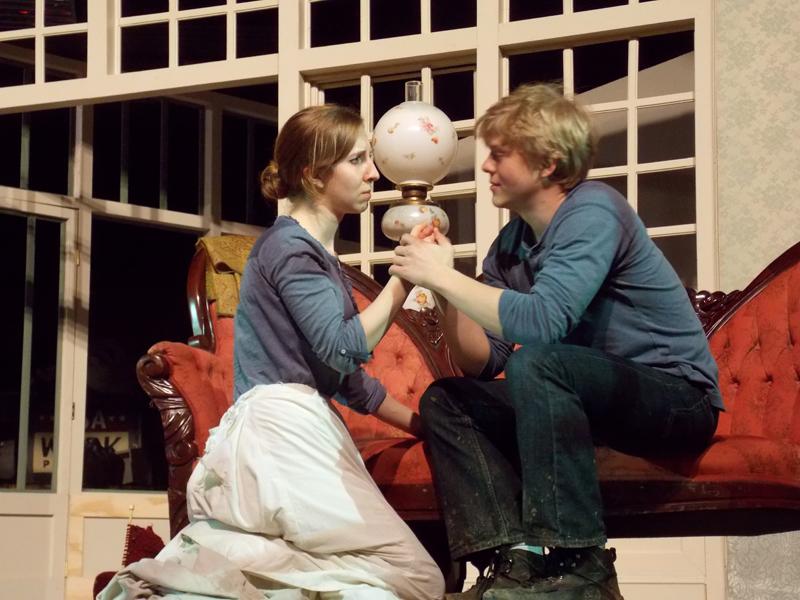‘GHOSTS’ Challenges Contemporary Questions of Morality
Double-degree junior Katy Early and College senior Colin Wulff rehearse their upcoming show, GHOSTS. The production, directed by Pro- fessor and Chair of the Theater department, Matthew Wright, will run from April 17–19.
April 18, 2014
Adultery, euthanasia, syphilis — who could ask for more in a play? The Oberlin College Theater Department’s Main Stage production of Henrik Ibsen’s classic play Ghosts will supply all three this Thursday through Saturday. Under the direction of Professor Matthew Wright, chair of the Theater department, the production is looking to make a lasting impression with the audience.
Written in 1881, Ghosts is widely recognized as a commentary on 19th-century issues of morality. The play opens with a speech by protagonist Mrs. Alving, played by double-degree junior Katy Early. She is dedicating a newly-constructed orphanage to her dead husband, Captain Alving. Mrs. Alving considers Captain Alving a degenerate because of his excessive philandering during their marriage and reveals the truth about the creation of the orphanage to her spiritual advisor Pastor Manders, played by College senior Brian Gale: She built the orphanage to deplete her husband’s wealth. Her son Oswald, played by College senior Colin Wulff, has recently returned home after traveling Europe for much of his life — mostly due to Mrs. Alving’s desire to keep him away from his father — and is suffering from congenital syphilis. To complicate matters, Oswald soon falls in love with his mother’s maid Regina Engstrand, played by College senior Sarah Rosengarten.
Mrs. Alving struggles throughout the play and is constantly forced to make difficult ethical decisions. She questions the traditional morality surrounding issues of euthanasia, incest and sexually transmitted diseases. According to Wright, the difficult moral issues addressed were the driving force for bringing this play to Oberlin. Moreover, he chose to stage Ghosts because of its place in the canon of theater history, which still resonates with contemporary issues.
“One of the main reasons for doing a production like this is for the opportunity to investigate Western theater questions set forth by the totally subversive Ibsen,” he said.
Wright also explained that the department aims to make connections between its plays and other arts features at the College. This show runs concurrently with Between Fact and Fantasy: The Artistic Imagination in Print, an exhibit at the Allen Memorial Art Museum that, among other things, features art made in the same era that Ibsen wrote Ghosts. The play and exhibit share the same philosophical notions as well, and Wright took his cast to this exhibit in order to help the group better understand the era. “It showed how gray life was like then, literally and symbolically,” Gale said.
In addition, the actors extensively researched the era and characters they were assigned. “I explored Norway’s history, cultural stigmas at the time regarding bohemian Paris, the symptoms generally associated with advanced syphilis, and lastly, Ibsen’s own remarks on the job of the actor and what he thought to be required of them in order to achieve the realistic quality he strove for in Ghosts and other plays, especially in the second half of his career,” Wulff said.
The task of representing a period piece accurately and eloquently can be arduous, but the cast and crew are optimistic about their final product. Gale described this production as the best he has been part of during his time at Oberlin, noting the positive rapport among the cast as well as Ibsen’s challenging source material.
Wulff expressed similar sentiments: “[The show] also feels appropriately like a culmination and a final passage. Most of all, it’s reflective of my experience with theater at Oberlin because I find I am still learning useful things at an appreciable rate while enjoying myself immensely.”
Even though the play first premiered 130 years ago, its central issues still hold a great deal of weight today. “[Ghosts] deals with a lot of explicit issues that are still deemed taboo subjects,” said Rosengarten. “It is definitely a critique with various complex issues that makes you think how such a rigid way of thinking complicates everybody’s lives.”
Tickets for the show can be bought at Central Ticket Service. General admission is $11 for the public, $8 for seniors, alumni and staff, and $5 for students. Tickets will cost $3 more at the door.
























